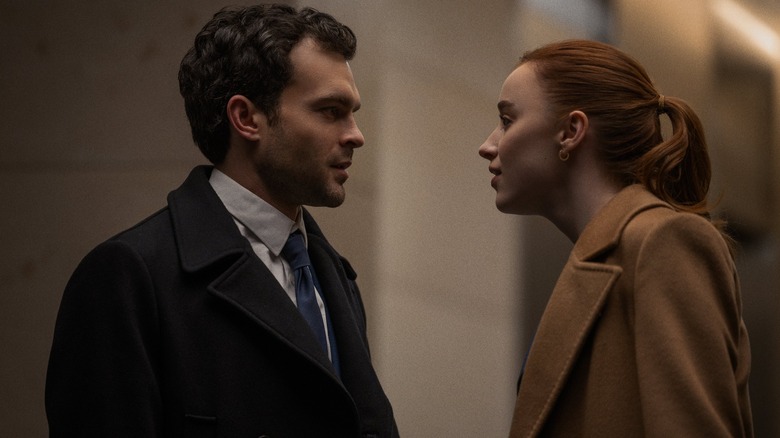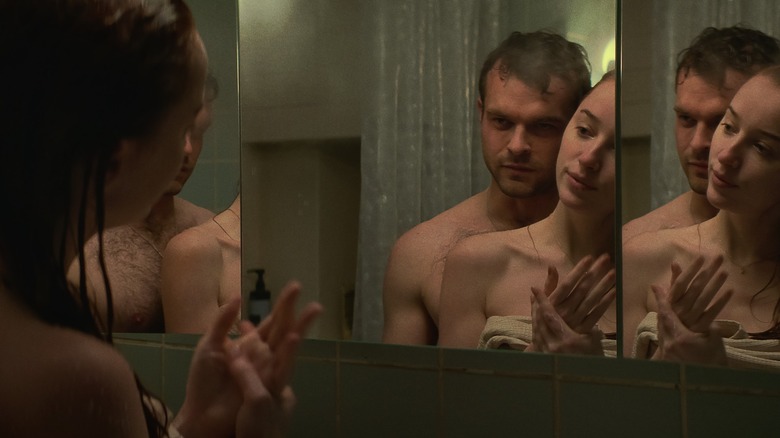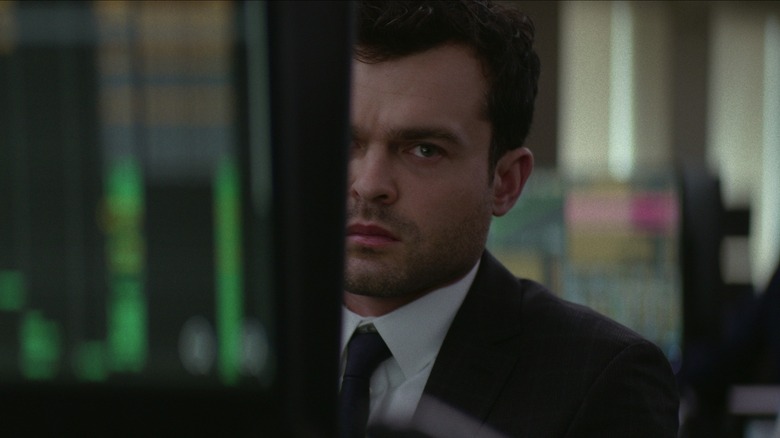Fair Play Ending Explained: When The Status Quo Spirals Out Of Control
Can a romantic relationship be truly democratic? Even the most sure-footed bonds are characterized by a sense of un-evenness, where the truth lies in consciously meeting halfway. Two people can never be completely in sync, but what makes such a symbiotic bond work is mutual respect and thoughtful consideration that is constant and reciprocal. What happens when a seemingly perfect romantic relationship is destabilized at the core?
This is what Chloe Domont's "Fair Play" digs deep into. Domont's corporate drama is a brutal, unflinching portrait of a relationship that starts to rot after an unexpected development, revealing uncomfortable truths about expected gender roles, deeply entrenched patriarchal mindsets, and the terrible cost of upholding a problematic status quo. When the equilibrium shatters, so does the rose-tinted veneer of individual reality.
It is tempting to describe "Fair Play" as an erotic thriller, as the film's core premise revolves around a corporate romance that needs to be kept under wraps, followed by themes of deception and betrayal that are integral to this particular sub-genre. While "Fair Play" brims with sexual chemistry between Emily (Phoebe Dynevor) and Luke (Alden Ehrenreich), eroticism is not the focus from the get-go, and the thrills induced are of a completely different variety than what thrillers generally impart. Instead, "Fair Play" descends into a feverish, volatile cycle of toxicity, exposing the heart of a dynamic that might have been deceptively hollow since the very beginning.
This ouroboros of guilt, shame, and jealousy begins and ends with blood, although these visual motifs take on a completely different meaning by the end. Let us dig into the bloody ending of "Fair Play" while dissecting the central relationship that crumbles and disintegrates with time.
What you need to remember about the plot of Fair Play
When we first meet Luke and Emily, they couldn't appear more perfect and well-suited for one another. After their secret workplace romance blooms into a wholesome, committed relationship, Luke proposes, and the two seem excited about announcing the news to the world eventually. In their shared workspace, the prospect of a promotion to the role of PM makes Luke giddy about a life of respect and comfort for the both of them, but when the promotion unexpectedly goes to Emily, the crux of their relationship is suddenly jeopardized, as Luke is no longer kind or supportive towards his partner. As time passes, he becomes increasingly bitter and vile.
The heart of the promotion fiasco is that while Luke perceives Emily's promotion as unexpected and in his mind, unfair, it was an inevitability from an objective standpoint. Immensely smart and capable, Emily had been an asset to the firm for years, and it was only natural that her superior, Campbell (Eddie Marsan), immediately considered her for the role of PM. Luke was never in the running, to begin with — if anything, his hiring was a favor, his presence in the firm was tolerable at best, and his frequent attempts at proving himself led to revenue losses on more than one occasion.
Just like any mediocre and deeply insecure man would, Luke asks Emily if her promotion was the result of Campbell making sexual passes at her or her granting him sexual favors. Not only is this a display of abhorrent sexism but also genuine disrespect towards Emily, who constantly tries to make herself small to accommodate Luke's fragile male ego, until she decides to snatch her autonomy back. The outcome is not only unpleasant but extremely painful and bloody.
What happened at the end of Fair Play?
The key to understanding the vignettes of the ending is to rewind back to the beginning, where the couple is seen making out in the bathroom, only for the encounter to be botched when Emily realizes she's on her period. Luke's mouth is smeared with her blood, and this moment is tender and intimate, especially as Luke proposes to her giddily right after. The presence of blood as a metaphor for the blooming of their relationship deliberately frames Luke and Emily as a duo worth rooting for: their tender, awkward moment in the bathroom cements their closeness, where they are able to giggle and kiss despite the messiness of the situation.
Fast-forward to the ending, where Emily towers over Luke, knife in hand, demanding an apology for his horrid actions. Over time, Luke's spiral is dizzying to witness, as he goes from a charming, smitten dude to an insecure, manipulative jerk who verbally berates his girlfriend to sabotage her and ends up raping her after a heated encounter in the bathroom. The contrast between the two bathroom scenes is horrifying, culminating in Emily scraping Luke repeatedly with a knife until he bleeds on the floor, demanding the apology he never freely gave her.
No, this is not a revenge thriller, as that would most likely end in murder — here, Emily lets Luke go, but only after she holds him accountable. In this case, accountability for horrid misogyny and deliberate cruelty demands a little violence, and Emily is ready to spill some blood to drive the point home.
"Now wipe the blood off my floor, and get out. I'm done with you now," Emily says after Luke admits that he is "nothing," finally owning up to his own hollowness and the depravity of his actions.
A film about male fragility
"Fair Play" situates Luke and Emily's dynamic in the center to hold a mirror to several uncomfortable truths. The inherently inhumane, cutthroat nature of the corporate world is at full display here, interwoven with casual sexism and patriarchal perceptions of men and women in power. A key example lies in the colleagues discussing Luke's potential promotion despite him never truly exhibiting merit — they just assume he might be next, as he served as the analyst for the person holding the position, which was then vacant.
In contrast, when Emily is promoted, the male colleagues whisper about her supposedly sleeping with Campbell, even though she's clearly deserving of the role based on her merit alone. This mindset also bleeds into discussions of Emily being a "nightmare" to report to and being labeled a "freak" for engaging in the same recreations that the men often indulge in. Luke's insecurities, coupled with his barely-concealed envy, add fuel to the situation, where he constantly makes her feel small by criticizing her wardrobe choices and gaslighting her into doing things he wants her to do.
While Domont intended to highlight these themes in vivid detail, she considers "male fragility" as the core of "Fair Play," encapsulated perfectly in the ending. Domont spoke to Netflix TUDUM about this thematic focus, saying that "the whole film really builds up to the moment when Emily finally gets Luke to acknowledge his own failure and his own weakness, when he finally mutters the words 'I'm nothing' — because more than being a film about female empowerment, this is really a film about male fragility." Yes, the last half-hour unravels female rage fueled by grief and humiliation, but Domont encases the ending with the consequences of male fragility left unchecked.
What the ending of Fair Play truly means
"Fair Play" is more complicated than being a tale of a relationship gone awry, or a woman wronged. Emily herself engages in problematic behavior, often: she rightfully wants to be respected for her abilities, but keeps quiet in the face of the sexist behavior her colleagues exhibit. While it is understandable that Emily needs to play the game to move up the corporate ladder, it is moments like these, when allowed to fester, spiral into deeply problematic and blatant displays of patriarchy and sexism, which impacts both men and women. On the personal front, Emily does not call Luke out even when he is repeatedly out of line, where he oscillates between calling her a prude and a "hooker," directly feeding into the Madonna-whore complex.
While Emily's hamartia is not standing up for herself as much as she should have, Luke roots his identity in toxic definitions of masculinity, replete with "reclaim the narrative" self-help talks that fuel such problematic mindsets. Luke would rather humiliate himself by groveling to a man who hates him than support a women who actively roots for him (and loves him), and deprive his partner of basic support and respect just because his sense of self has been rattled. Deep down, Luke knows he is not a capable analyst, nor is he a model partner, but instead of working on himself, he degrades a woman who is capable and willing to make it work, leaving behind a hollow legacy of manipulation and abuse.
In the end, Emily has had enough, and her heartbreak feeds into rage, and she brute-forces the apology she deserves. While Luke grovels and begs for another chance, she lets the knife drop with a definite clang, leaving the uneven status-quo to die out on its own.




